- Home
- Brand, Max
Silvertip's Roundup Page 6
Silvertip's Roundup Read online
Page 6
“There’s a chance that Jim Silver will find his trail,” said Christian. “There’s a chance that we’d better be leaving this house now.”
“If Silver comes — look,” said Babe. “Is there anything better than that? We’re ready for him, and he comes. He’s bound to come some day, ain’t he? And can he come when we’re any better ready for him than we are now?”
“In your own simple, honest way,” said Christian, “you have ability to go straight to the point, Babe. I have an idea that you may be right. And — do you think you’d really enjoy yourself with Taxi?”
“Enjoy myself?” said Babe. “Say, when have I had my hand in? When have I had it in for a year, pretty near?”
“True,” said Christian gently. “And hunting dogs should be fed plenty of red meat.”
“Yeah, lemme have him,” said Babe. “I’ll spread him out thin and make him last.”
“Why, have it your own way, Babe,” said Christian.
“Hi!” grunted Babe, delighted.
He took his hands from the head of Taxi. But he let his grasp fall on one of Taxi’s shoulders, the big, blunt fingers feeling through the flesh toward the bone with a bruising and yet a merely exploratory force.
“He’s the right sort, this bird. He’s fleshed up right,” said Babe.
Christian raised one finger.
“Mind you, Babe,” said he, “if Taxi should by any chance get away, nothing will help you.”
“Get away?” shouted Babe, filling his throat with laughter. “Why, after I’ve had him for a coupla hours, he won’t be able to walk!”
“Well, well, well,” murmured Christian. “Do as you please. And when you think that you’ve softened him enough, you can call me, and I’ll have a look at him.”
“It won’t be long,” said Babe. “I know a coupla things, chief.”
He lifted Taxi to his feet and took him with a prodigious hand by the nape of the neck.
“Walk, son,” said Babe.
He took Taxi into a hallway, down it, and through a door into a small room. Taxi made no effort to escape, partly because he knew that if he made a sudden lunge, that one hand might almost break his neck; partly he was quiet because he knew that Pokey was following, carrying a lantern and holding the sawed-off shotgun under his right arm. Only the rankest fools in the world take chances when there is a sawed-off shotgun in the field against them.
Pokey hung the lantern on a peg in the wall.
There was nothing in the room except a wooden cot with a pair of blankets thrown across the canvas.
“Lemme stay and look,” said Pokey, leering.
“You get out,” answered Babe.
Pokey left, cursing his luck. “I’m goin’ to have a crack at what you leave of him, one day,” said Pokey, as he went out.
“Yeah,” answered Babe. “Maybe the buzzards are goin’ to have their chance at this hombre.”
He locked the door behind Pokey and put the key in his trousers pocket.
Taxi, seeing all of that room at a glance, saw that there was nothing that could in the least degree serve him as a weapon — nothing except a leg of the cot, if he had a chance to pull it off.
If he could get at the lantern and put it out, then in the darkness that ensued, he might be able to do something with this man beast. But he was by no means sure.
He had been at a zoo and seen an orang-utan smile, the lips wrinkling back, fold after fold, until the big canines were exposed. Babe was smiling at him the same way now. His mouth was a huge slit, but the lips were much larger than they needed to be. They were thin, and they had to pucker up in the center so that they would fit with some closeness over the teeth. And the teeth themselves, at the corners of the mouth, were extra long and extra sharp.
Taxi realized, with a sense of curious surety, that this man could hardly be blamed for anything he did with his life. There was not room for a proper brain under that cramped forehead. The back of the head actually sloped forward from the bulge of the vast neck. There was very little to the neck. Taxi felt that if he tried for a flying stranglehold a mere lowering of the vast, craggy chin would break his arm.
However, the strongest rocks may be split if they are tapped at the proper place. The proper place to tap the human rock is just beside the point of the chin.
“All right,” said the brute. “Take off your coat, kid. I don’t want no padding on you when I start patting you.”
Taxi slid obediently out of his coat, seeing that his jailer was also peeling off a coat and exposing a shirt of thick red flannel. It was a perfect opportunity. Taxi spun suddenly to give the full weight to his punch. He took a flying hitch step forward and slammed his right fist, like a lump of iron, right on the button.
The shock started his arm trembling to the shoulder. The shudder of that vibration went right through his body.
It was his right hook delivered as he never had sent it home before. Paddy had said that even a giant would fall if that punch landed fairly on the button, but surety must be made extra sure.
The delivery of the blow had swung him off to the left, leaning forward. Now, as he straightened himself, he swayed all his weight, all his lifting power, all his savage despair, into two driving uppercuts. They landed, one, two, right under the chin of Babe, and Taxi stepped lightly back to let the ruin fall.
But Babe was not falling.
There was a red streak on the side of his chin where the force of the first blow had actually split the tough hide against the bone, but in the buried, apelike eyes of Babe there was no sign of dimness. He was smiling. He had not even continued his attempt to pull off the coat which was now wedged over his elbows.
He bobbed his vast head up and down in short nods, because his abbreviated neck did not allow him much of a sway. The bulge of his chest struck his chin too soon for that.
“Good!” said Babe. “For your weight, kid, you’re a beauty.”
Taxi, standing back toward the opposite wall, understood that he had failed and he knew what that failure meant.
Babe finished taking off his coat. He folded it with care. He brushed off a spot of dust that troubled his eye and laid the coat out on the cot.
After that he turned slowly toward Taxi.
His loose lips were stretching, rolling back from his teeth, closing, grinning again, just as the mouth of the orang-utan in the zoo had smiled when the keeper came, bringing fresh food.
In the mind of Taxi flashed a perfect picture of the big yellow teeth sinking into his jugular.
Then he stepped out, with a good, high guard, to fight his best — though he knew that his best would not be good enough.
X
Torturers
BABE could not hit Taxi. He could land on him, but never solidly. Babe tried everything he knew, and he knew a good deal. He shadow-boxed, with Taxi as the ideal target. He tried shifts and double shifts, one-two punches, overhand wallops, swinging, chops, jabs, half-arm and full-arm uppercuts. He feinted and hit; he double and triple-feinted and hit; and always he was either having his punches muffled while they were still in the air, or else Taxi rode with the blows to rob them of force.
In the meantime, Taxi was doing execution of his own. He did not hit many times, comparatively, but his strokes counted. He played on the loose lips of Babe. He played at the bony ridges which covered his eyes, and thumped him on the abortive nose which was like a shapeless lump of gristle in the middle of Babe’s face. He drew streams of blood from Babe before at last the gorilla decided that man-made methods of war were not for him.
He simply waded in through Taxi’s attack and crushed him to numb helplessness. Then he trussed Taxi under one enormous arm. He held Taxi close and beat him with a deliberate enjoyment with the other fist. It was like a lump of lead incased in a bit of rubber hose. Wherever it fell, it bruised. When he was satisfied with what he had done to Taxi’s face, he turned him over and beat him across the kidneys and lungs. Blows there hurt ten times as much as blows struck t
o the head.
After a while Taxi could not move. Then Babe took him by one foot and dragged him into the big room at the front of the cabin, where Barry Christian looked up from a book.
“He can still listen to you,” said Babe. “Wanta talk to him?”
“Let me have a look at him,” said Christian.
Babe took up Taxi by the nape of the neck and muscled him out at arm’s length. Taxi tried to stand straight, but his legs wobbled beneath him as though they were adrift in a troubled current of water. He tried to hold up his head, but Babe had beaten the base of his neck, and the nerves wouldn’t work. His head fell over on his shoulder.
“Sit him down by the fire, the poor fellow,” said Christian. “No, please not in that chair, Babe. We don’t want the blood to stain everything, do we? Just leave him there. I don’t imagine that he’ll get up and run away.”
Babe laughed. “He won’t run away,” he said. “I done it scientific. He won’t get up and run away.”
Taxi looked at him. He could almost sympathize with the immense contentment of Babe.
“It looks to me,” said the gentle voice of Barry Christian, “that he did a little scientific work on you, too, Babe.”
“Does it?” asked the Babe cheerfully. He took a forefinger and collected the blood off his face and flicked it into the fire. Babe began to laugh. “Yeah, he’s scientific. You take a little fist, like his, and it cuts, is what it does. But I never had a better time in my life. It was like shadow boxin’, and the shadow couldn’t be hit. It was like punchin’ at a dead leaf, and the wind of your punches keeps knocking that leaf out of the way. I never had a better time. It was exercise, was what it was.”
“A little more exercise like that, and perhaps you won’t have much of a face left,” suggested Christian.
“Well,” said the Babe, “the good thing about a mug like mine is that it’ll stand wear. It ain’t pretty but it’ll stand wear. I’ll plant a beefsteak on it after a while, and it’ll be all right. Maybe Scotty will have to take a couple of stitches over this here eye. I don’t know. If you got some good material, it’ll stand patches.”
“Get some vinegar,” said Barry Christian.
“Not for me,” said Babe.
“Get some vinegar,” said Christian.
Babe went for some vinegar and came back with a glass half-filled with it.
“That’s all the chink says that he can spare,” observed Babe.
Christian held the glass in his hand and closed his eyes as he inhaled the strong fumes.
“Now, Taxi,” said he, “can you talk?”
“Yes,” said Taxi.
“Perhaps you’ve observed,” said Christian, “that we are people who mean what we say. For my part, I’ve allowed this to be done with regret. A quick and merciful killing would have served my end, but Babe thought that he could soften you a little, to use his exact words, which you’ll remember hearing. Therefore I’ve allowed him to try his hand. And after all, Taxi, isn’t it better for us to endure a little pain on earth than for us to rush straight into hellfire? Or will you go to a pleasanter place?”
Taxi smiled.
“A sense of humor, too,” said Christian. “And what could be better than that? What could be more humanly useful? It proves that a man has capacities for tact and contact, humanly speaking, when he shows a sense of humor. I hope you will prove to have sufficient sense, Taxi, to understand by this time that it would be much wiser for you to talk to me?”
“Well?” said Taxi.
“I mean to say, it would be wiser for you to tell me what I want to know — why Silver asked you to come out here and what Silver has in mind to do. What clews he picked up about — well, let’s call it about Feeley’s little game. Are you ready to talk?”
It seemed to Taxi a fortunate thing that this was a subject on which he did not need to make a decision. The decision was already made by that code according to which he had to live or die. The code says that a man in the final pinch does not talk. He takes his medicine and does not talk because talking eventually turns a man into something worse than a dog.
“No,” said Taxi. “I’m not talking.”
“Listen to him,” said the Babe, with enthusiasm. “He’s all right, ain’t he? He can take it. He likes to take it, I tell you.”
Christian sighed, rose from his chair, and leaning over Taxi, began to separate with his fingers the lips of the wounds on Taxi’s face. Into those wounds he poured vinegar. The effect was incredible. In each case it was like having the flesh seared with red-hot iron.
One groan swelled the throat of Taxi and could hardly be stifled. After that his swiftly-working brain paralyzed his entire body. It takes practice and a will of steel to be able to do that. But when one knows that the other gang is about to take possession of one’s body, it is well to will the body out of existence. That was what Taxi had learned to do. He had gone through the third degree half a dozen times, also, at the hands of those earnest inquirers, the police. Therefore there was very little about the enduring pain that he did not understand.
With all the might of his brain he gripped himself, numbed himself, and withstood this torture.
Finally Christian stepped back. His nostrils were quivering as though he were inhaling a delicious fragrance. His eyes shone with the light that Taxi had seen in them once before.
“Look at that bird!” said the Babe. “Can he take it? He can!”
“There remain the eyes,” said Christian.
“Yeah. There’s still the eyes,” agreed Taxi.
“And you’re not talking?” urged Christian.
“No.”
Christian leaned over him once more. He plucked up the swollen lid and allowed the vinegar to run in on the tender ball of the eye. The burning seemed to pass right on into the center of the brain. It seemed to eat away at the very core of that nerve power which had been ruling out the sensation of pain. One great shudder ran through the body of Taxi. He told himself that he was about to scream out. And then, by the grace of mercy, he fainted.
When he recovered, he was lying on a damp, cold floor of beaten earth. The lantern on the wall burned obscurely through the mist in the air that was half water vapor and half smoke.
He could see that through the slits that remained to him. It seemed strange that there was still the power of sight in his eyes. But he could see the smoking light of the lantern, and he could also see the face of Babe, who sat in a chair at a side of the room. There was no window. There was a short flight of steps leading up to a door which was flush, at the top, with the ceiling. Some small buckskin sacks were piled in the corner of the room. There was nothing else to see. Gradually he understood that he was in a cellar beneath the cabin.
He pushed himself to a sitting posture. His wrists were manacled behind his back. His legs were manacled at the knees and the ankles. His coat lay beside him on the ground.
Babe now looked up from his newspaper. He sat slued to the side in order to bring his paper into a better relation with the lantern light. Now he folded the paper and turned his battered face toward Taxi.
“How feeling, boy?” he asked.
“Fit as a fiddle,” said Taxi weakly.
“That’s good,” said the Babe. He asked anxiously: “Feeling like talking yet?”
“No,” said Taxi.
Babe sighed with relief. “I knew you wouldn’t,” he remarked, almost fondly. “I had a kind of a faith and a trust in you, like a baby. I knew that you wouldn’t buckle and knuckle under like a cur. There’s stuff in you, kid, that I been countin’ on. I suppose we better take our little exercise. Kind of just a matter of form that I had to ask you, first, if you wanted to talk.”
He came to Taxi and lifted him from the ground and beat him, holding him with one hand, hammering him with the other.
On every bruised place Babe’s fists fell with a redoubled force. The whole nervous system seemed to have been multiplied by a thousand in order to register the force of th
at agony. The weight of the blows drove out the breath in gasps, whistling through the clenched teeth of Taxi. But those breaths never became vocal.
After a while he knew that his senses were fading out of him. He felt that another endurance test, like this, would be the end of life in his body. Then the lantern light began to darken and ceased.
When he wakened again, he was alone in darkness. He told himself, at first, that he was simply blind, but when he spoke the name of Babe, he received no answer. He was actually alone. In addition, he felt that he was dying.
Thirst was a greater pain than the bruises which covered his body. Besides, he lay in a stinging fire of fever that consumed him.
After a while, he found that he was breathing more easily. He began to forget all the pains in his body as he concentrated on the faces of these men. He called up Barry Christian, Babe, Larue, Pudge, Scotty, Pokey. He called them up as judge and as executioner. He began to apportion deaths for them.
So it was that after a time he found that his own pains were disappearing. If he allowed his mind to turn to them, the agony rushed back over his brain in a wave. So he calmly turned his mind from the pain, and therefore it was no more.
They had left him in darkness, trusting to the irons and the effects of the beatings that had stretched him senseless to keep him quiet. Nobody in the know back East would have been so foolish, but of course these fellows could not understand what he was able to do.
He started to slip the cuff off his left hand. That was why he went, each day, through exercises which made that left hand supple. It was a painful job, but he knew all about the pain. He could draw the hand through the steel grip for a little distance, but then it stuck. And now he found that his strength was so limited that after each effort the dizzy sickness spread over his mind again.
He had to relax and devote his attention to deep breathing. Then pain would leap at him and have to be ruled away. When that was gone, he would try again. Finally he got his left hand free. The skin on the backs of the knuckles and the thumb was scraped away, but that made no difference. His left hand was free!

 Alcatraz
Alcatraz the Long, Long Trail (1923)
the Long, Long Trail (1923)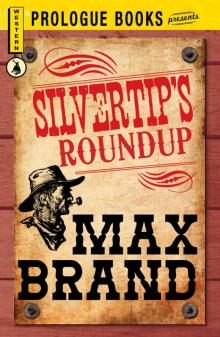 Silvertip's Roundup
Silvertip's Roundup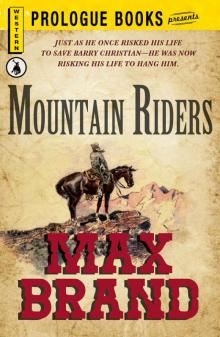 Mountain Riders
Mountain Riders Silvertip (1942)
Silvertip (1942)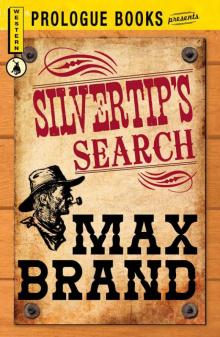 Silvertip's Search
Silvertip's Search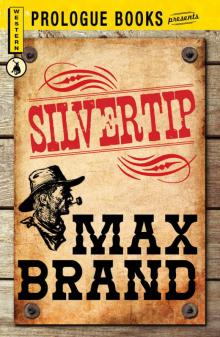 Silvertip
Silvertip Bull Hunter
Bull Hunter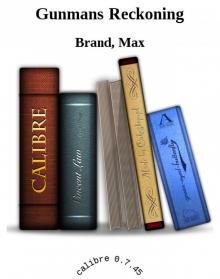 Gunmans Reckoning
Gunmans Reckoning The Seventh Man
The Seventh Man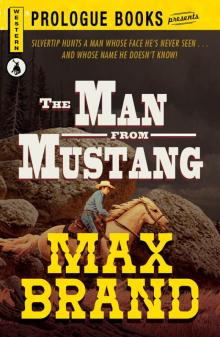 Man From Mustang
Man From Mustang Riders of the Silences
Riders of the Silences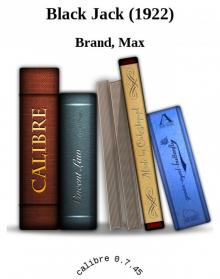 Black Jack (1922)
Black Jack (1922) Way of the Lawless
Way of the Lawless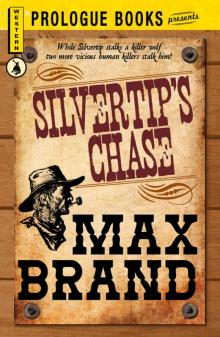 Silvertip's Chase
Silvertip's Chase Trailin
Trailin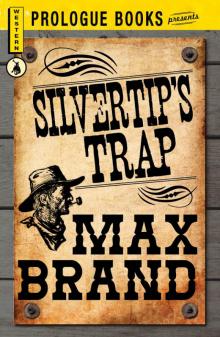 Silvertip's Trap
Silvertip's Trap Ronicky Doone (1921)
Ronicky Doone (1921) The Night Horseman
The Night Horseman the Garden Of Eden (1963)
the Garden Of Eden (1963)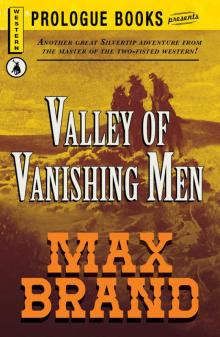 Valley of the Vanishing Men
Valley of the Vanishing Men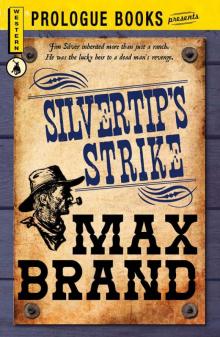 Silvertip's Strike
Silvertip's Strike Black Jack
Black Jack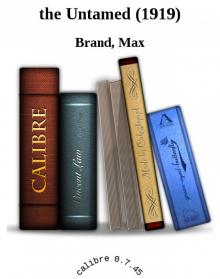 the Untamed (1919)
the Untamed (1919) Way Of the Lawless (1921)
Way Of the Lawless (1921) The Untamed
The Untamed